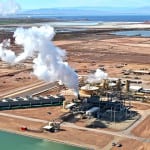Last Thursday, U.S. Energy Secretary Steven Chu announced that eight projects in five states (California, Connecticut, Louisiana, Texas, and Utah) have been selected to receive up to $11.3 million to support the research and development of pioneering geothermal technologies.
The projects are expected to foster innovation in the technologies and methods used to generate geothermal energy, which will help strengthen U.S. energy security and increase America’s competitiveness in the global clean energy economy. Continued innovation and technical advances will also help geothermal energy to play an important role in achieving President Obama’s goal of generating 80% of U.S. electricity from clean energy sources by 2035, the DOE said.
The projects aim to develop fundamentally new ways of producing electricity from the Earth’s heat. Selected projects will conduct feasibility studies in Phase I, including technical and economic modeling and component design for technologies that recover geothermal heat for electricity production. If selected for Phase II, projects will then validate the designs in real-world environments. The selected projects are part of the DOE’s comprehensive efforts to reduce the cost of geothermal energy to be competitive with conventional sources of electricity.
Selected awardees are:
- GeoTek Energy, LLC (Midland, Texas): up to $2.85 million. The Gravity Head Energy System project will study the technical feasibility of a new generation of gravity-driven downhole pump.
- Gtherm, Inc. (Westport, Conn.): up to $200,000. The Single Well Engineered Geothermal Systems project will investigate the technical feasibility, heat extraction potential, and cost impact of a single-well geothermal system.
- Lawrence Berkeley National Laboratory (Berkeley, Calif.): up to $4.99 million. The Geothermal Energy Coupled with CCS: Heat Recovery Using an Innovative High Efficiency Supercritical CO2 Turboexpansion Cycle project will develop new ways to produce electricity from superheated and pressurized carbon dioxide (CO2) in deep geothermal formations.
- Lawrence Livermore National Laboratory (Livermore, Calif.): up to $874,000. The Active Management of Integrated Geothermal-CO2 Storage Reservoirs: An Approach to Improve Energy Recovery and Mitigate Risk project will study the technical and economic feasibility of integrating geothermal energy production with carbon capture and storage.
- Louisiana State University (Baton Rouge, La.): up to $997,000. The Zero Mass Withdrawal, Engineered Convection and Wellbore Energy Conversion project will evaluate the technical and economic feasibility of technologies that circulate reservoir fluids to increase heat extraction.
- Physical Optics Corporation (Torrance, Calif.): up to $200,000. The Heat Extraction from Geothermal Systems project will investigate the technical feasibility, heat extraction potential, and cost impact of an innovative wellbore condenser technology. This technology converts hot vapor into cooler liquids at high efficiencies, which could help generate greater geothermal power.
- Terralog Technologies USA, Inc. (Monrovia, Calif.): up to $541,000. The Advanced Horizontal Well Recirculation Systems for Geothermal Energy Recovery project will investigate and develop advanced geothermal well designs that optimize combinations of vertical and horizontal wells.
- University of Utah (Salt Lake City, Utah): up to $671,000. The Novel Development of Geothermal Systems in the United States project will assess the electric generating capacity, economics, and environmental impacts of developing deep sedimentary and crystalline reservoirs throughout the entire United States.
For more information about the DOE’s Geothermal Technologies Program and selections, visit the Geothermal Technologies Program’s website.
Source: DOE









